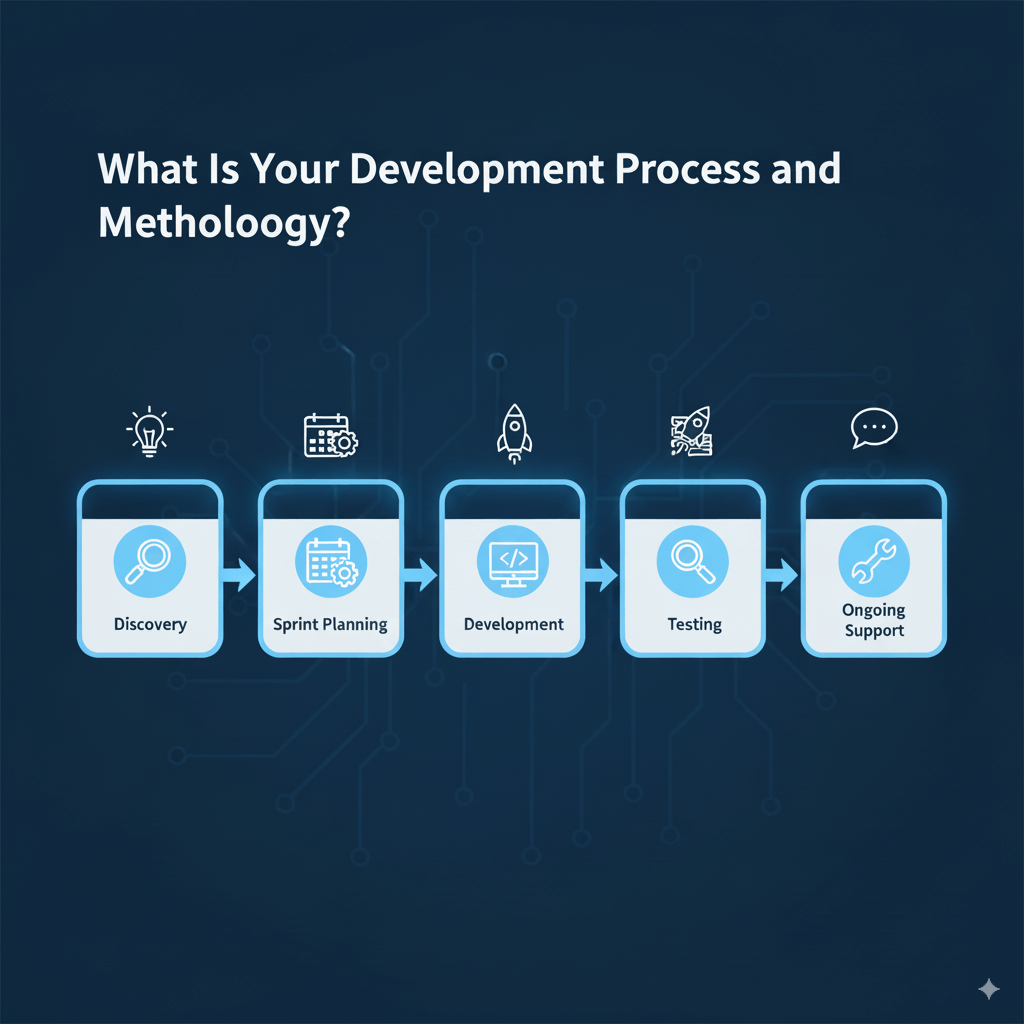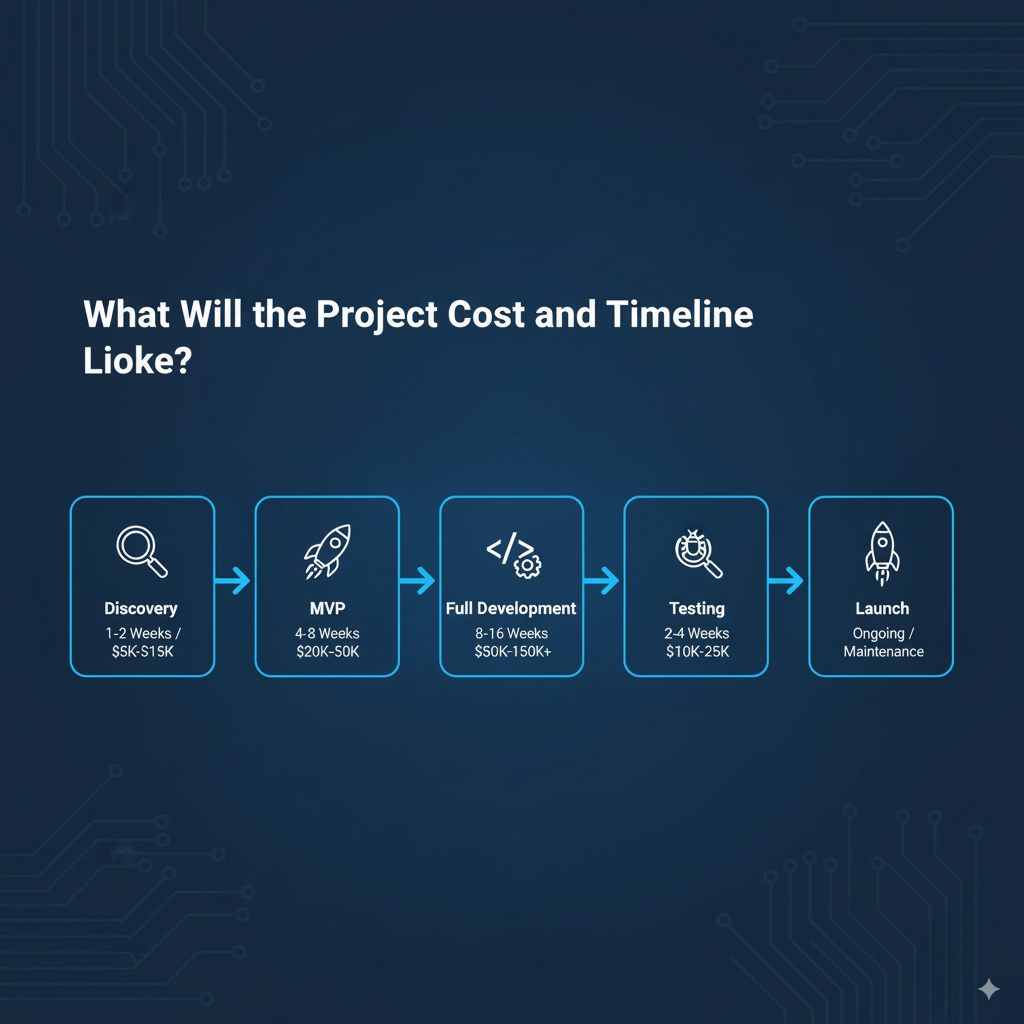10 Questions to Ask a Blockchain Development Company Before Hiring
- BLOG
- Blockchain
- September 24, 2025
Blockchain has moved far beyond hype. Enterprises, startups, and even governments are building solutions for finance, supply chain, identity, and gaming. But the success of any project depends heavily on choosing the right development partner.
The risks are real. According to Gartner, up to 92% of blockchain pilot projects fail before reaching commercial deployment. The main reasons: lack of technical capability, weak security practices, and poor vendor fit.
Hiring the wrong company can mean wasted budgets, missed deadlines, and products that never make it to market. For founders, that can cripple fundraising. For CTOs, it can stall digital transformation initiatives.
That’s why due diligence is critical before signing a contract. Asking the right questions uncovers whether a vendor truly understands blockchain architecture, compliance requirements, and your industry use case. It also helps you separate marketing talk from proven experience.
In this guide, we’ll cover 10 essential questions to ask any blockchain development company before you hire them. These questions will give you insight into their technical depth, security standards, and ability to deliver long-term value.
By the end, you’ll know how to evaluate vendors, avoid costly mistakes, and choose a blockchain partner that increases your odds of project success.
Contents
- 1 Question 1 – What Is Your Experience with Blockchain Projects Like Ours?
- 2 Question 2 – Which Blockchain Platforms Do You Specialize In?
- 3 Question 3 – How Do You Handle Security and Compliance?
- 4 Question 4 – What Is Your Development Process and Methodology?
- 5 Question 5 – How Do You Ensure Scalability and Performance?
- 6 Question 6 – What Will the Project Cost and Timeline Look Like?
- 7 Question 7 – How Do You Approach Maintenance and Post-Launch Support?
- 8 Question 8 – Can You Provide References or Case Studies From Past Clients?
- 9 Question 9 – What Is Your Security Approach for Smart Contracts and Infrastructure?
- 10 Question 10 – What Is Your Pricing Model and How Do You Handle Contracts?
- 11 Conclusion: Choosing the Right Blockchain Development Partner
- 12 Frequently Asked Questions About Hiring Blockchain Developers
- 12.1 1. What questions should I ask a blockchain development company before hiring?
- 12.2 2. Why do so many blockchain projects fail?
- 12.3 3. Do I need to hire blockchain developers in-house or can I outsource?
- 12.4 4. How do I evaluate the security expertise of a blockchain vendor?
- 12.5 5. What role does compliance play in hiring a blockchain company?
- 12.6 6. How do I know if a vendor is the right cultural and technical fit?
- 12.7 7. Are blockchain development costs standardized?
- 12.8 8. Can non-technical founders effectively work with blockchain vendors?
Question 1 – What Is Your Experience with Blockchain Projects Like Ours?
The first thing to clarify when speaking with a blockchain development company is their relevant experience. Not all blockchain projects are created equal. A team that built an NFT marketplace may not have the right expertise to deliver a DeFi protocol or a supply chain solution.
Ask the vendor for case studies or examples of projects similar to yours. Look at the industries they’ve worked in, the type of blockchain platforms they used, and the outcomes they achieved. For example, a logistics-focused company should be able to show work with Hyperledger or enterprise chains, while a DeFi-oriented vendor should have a proven track record with Ethereum or Polygon.
It’s also worth digging into their track record beyond the tech stack. Have they built proofs-of-concept (PoCs) and taken them to full production deployments? Many vendors stop at prototypes but lack the depth to scale into production-ready systems.
When you’re evaluating their portfolio, ask for references or client testimonials. Speaking directly to past clients can reveal whether the company delivered on promises, met deadlines, and stayed within budget.
Finally, make sure their experience includes MVP delivery. This shows they understand how to build iteratively and test real-world adoption, rather than trying to launch a full-scale product from day one.

Question 2 – Which Blockchain Platforms Do You Specialize In?
Not every blockchain platform works the same way. The choice of technology directly impacts scalability, security, transaction fees, and regulatory compliance. That’s why one of the most important questions to ask is: which blockchain platforms does the company specialize in?
Some companies have strong expertise in Ethereum and its Layer-2 scaling solutions, making them suitable for DeFi, NFTs, and tokenization. Others focus on Hyperledger Fabric or Corda, which are better for enterprise use cases like supply chain, healthcare, or trade finance. Emerging platforms like Polygon, NEAR, and Solana bring advantages in speed and cost-efficiency, while still requiring careful handling to ensure security and adoption.
A strong blockchain development partner won’t just list names of platforms. They should be able to explain why they recommend one platform over another for your project. For example, Ethereum is ideal for projects that need ecosystem support, while Hyperledger is preferred when privacy and permissioning are priorities.
Red flag: companies that claim to “specialize in everything.” True expertise usually comes from working on several deep projects in a few ecosystems, not dabbling in every chain.
Asking this question helps you identify whether the vendor can align technology choices with your business goals, rather than trying to fit your project into a platform they’re most comfortable with.

Question 3 – How Do You Handle Security and Compliance?
Security and compliance are two of the biggest deal-breakers when choosing a blockchain development partner. Even the most innovative product can collapse if it’s not built with strong protections in place.
Start by asking about their security protocols. Do they conduct smart contract audits? How do they manage keys and permissions? What steps are taken to prevent vulnerabilities like reentrancy attacks, front-running, or DDoS? Look for evidence of penetration testing, code reviews, and adherence to OWASP security standards.
Compliance is just as critical. Regulations around crypto and digital assets are evolving quickly, and non-compliance can shut down a project overnight. Ask if they have experience with KYC, AML, GDPR, and local jurisdictional rules. A partner that has successfully navigated regulatory frameworks in finance, healthcare, or government projects is usually a safer bet.
The risks of ignoring this are well documented. According to Coinlaw.io, only 41% of blockchain projects have a dedicated compliance officer or team, and 55% of digital asset platforms have faced at least one regulatory investigation in the past 18 months. These numbers highlight how often compliance gets neglected, and why you need a partner who takes it seriously from the start.
When evaluating a company, look for clear documentation of their compliance processes and ask who will be responsible for ensuring regulatory alignment. The best firms don’t just deliver code, they deliver systems that can withstand both technical and legal scrutiny.
Question 4 – What Is Your Development Process and Methodology?
A blockchain project is only as strong as the process behind it. That’s why it’s critical to ask how a development company approaches project management and delivery.
Look for companies that follow Agile or Scrum methodologies. These frameworks break the project into sprints, with regular demos and feedback loops. This way, you’re not waiting six months to see progress – you get incremental updates, and the team can adjust quickly if requirements change.
Ask about milestone planning. A reliable partner should give you a clear roadmap with stages like requirements gathering, architecture design, development, testing, deployment, and post-launch support. Each stage should have deliverables, timelines, and accountability.
Communication is another piece of the puzzle.
- Does the team provide weekly reports?
- Are you invited to sprint reviews?
- Do they use tools like Jira, Trello, or Slack for transparency?
These practices help keep projects on track and prevent unpleasant surprises.
Finally, clarify how they handle quality assurance. Blockchain projects can’t afford bugs in production, especially when handling financial assets. Make sure their methodology includes thorough testing – from unit and integration tests to security audits before launch.
The best partners don’t just write code; they manage the project like a product, keeping your business objectives front and center at every stage.

Question 5 – How Do You Ensure Scalability and Performance?
A blockchain project that works in testing can easily break down under real-world usage if scalability and performance aren’t built in from the start. This is why you need to ask how a development company prepares for growth.
First, clarify how they handle transaction throughput. Can the system support hundreds or thousands of transactions per second without slowing down? Look for mentions of Layer-2 scaling solutions, sharding, or sidechains as part of their design strategy.
Second, ask about infrastructure planning. Do they use cloud-native deployments on AWS, Google Cloud, or Azure? How do they handle auto-scaling, load balancing, and distributed storage? These factors decide whether your system can expand smoothly as usage grows.
Testing is another key area. A reliable partner should run stress tests and performance benchmarks before launch. This shows how the system behaves under heavy loads and helps catch bottlenecks early.
Finally, scalability isn’t only about technology, it’s also about design choices. Ask if the vendor builds modular architectures, so new features and integrations can be added without breaking the existing system.
A blockchain platform should not just work today. It needs to handle tomorrow’s growth, whether that’s more users, higher transaction volumes, or new business models.
Question 6 – What Will the Project Cost and Timeline Look Like?
Budget and delivery time are two of the most practical questions you need to clarify with any blockchain development partner firm. Without transparency here, projects risk running over budget or stalling indefinitely.
Start by asking whether they offer fixed-price contracts for well-defined scopes or prefer time-and-materials pricing for flexible projects. Fixed pricing works best for MVPs with clear deliverables, while iterative builds often fit better with time-based models.
Next, break down the costs. A serious partner should provide an estimate that covers:
- Development and testing
- Security audits
- Integration with external systems
- Maintenance and updates after launch
Timelines will vary. A proof-of-concept might take 8–12 weeks, while a full-scale platform with multiple integrations can run 9–12 months or longer. Ask how they manage scope creep and what happens if deadlines slip.
Cost-effectiveness is a major factor in today’s blockchain market. According to Data Insights Market, the outsourcing blockchain development market is projected to grow from $2.5 billion in 2025 to $12 billion by 2033, with a CAGR of 25%. Startups and SMEs in particular choose outsourcing for scalability and lower costs compared to in-house teams.
Finally, ask about payment schedules. Reputable vendors often structure payments around milestones, so you pay as tangible progress is delivered rather than all upfront.
Clear expectations around cost and delivery reduce risk and keep both sides aligned on business outcomes.

Question 7 – How Do You Approach Maintenance and Post-Launch Support?
A blockchain project doesn’t end when the code is deployed. In many ways, that’s when the most critical phase begins. Without proper maintenance and post-launch support, even the best-built platforms can face downtime, security breaches, or usability problems that damage user trust.
When talking to a blockchain developer, clarify what their post-launch services include:
- Bug fixes and performance optimization – Critical for ensuring smooth user experience as traffic scales.
- Smart contract updates – Some platforms need contract upgrades to add features or patch vulnerabilities.
- Infrastructure monitoring – Regular health checks on nodes, APIs, and integrations.
- Regulatory updates – As blockchain laws evolve, platforms may need adjustments for compliance.
Ask if they provide a dedicated support team or a ticketing system, and what their response time SLAs look like. A solid partner should offer 24/7 monitoring and clear escalation paths for critical issues.
You should also discuss the cost model for ongoing support. Some vendors charge a flat monthly retainer, while others bill hourly. Make sure you know how updates, emergency patches, and long-term upgrades are handled.
Finally, ask whether they have experience keeping projects compliant with emerging regulations.
Having a reliable support partner means your platform stays secure, compliant, and aligned with user expectations long after launch.
Question 8 – Can You Provide References or Case Studies From Past Clients?
When selecting a blockchain development company, nothing validates their expertise better than client references and case studies. A portfolio can highlight technical skills, but references show how those skills translate into successful project delivery.
Ask the company for specific examples of past blockchain solutions they’ve delivered. Case studies should outline:
- Project scope and objectives – What problem did the client need to solve?
- Technology stack – Which blockchain protocols, frameworks, or integrations were used?
- Challenges and solutions – Did they overcome regulatory hurdles, scalability bottlenecks, or security issues?
- Results – Tangible outcomes such as improved transaction speed, reduced costs, or successful user adoption.
References also allow you to hear directly from clients about the company’s communication style, timeliness, and ability to pivot when unexpected challenges arise. This matters because, according to Gartner, up to 92% of blockchain pilot projects fail before reaching commercial deployment, often due to weak partnerships or lack of real-world readiness.
Ideally, request references in your industry. If you are in fintech, for example, you’ll want a provider that has already navigated compliance-heavy environments. If you’re building a GameFi platform, prior experience with NFTs and tokenomics will be essential.
A trustworthy partner will be transparent about their track record and willing to connect you with former or current clients who can speak candidly about their experience.
Question 9 – What Is Your Security Approach for Smart Contracts and Infrastructure?
Security is one of the most critical concerns in blockchain development. A single vulnerability in a smart contract or infrastructure layer can lead to irreversible financial loss and reputational damage. When evaluating a blockchain development company, you need to understand their security-first mindset and the processes they follow.
Start with smart contract security. Ask if they conduct formal audits, whether internally or through third-party firms. Good practices include:
- Static and dynamic code analysis tools
- Manual code reviews by multiple developers
- Simulation of attacks such as reentrancy or overflow exploits
- Bug bounty programs for ongoing monitoring
Infrastructure security is just as important. Find out how they secure nodes, APIs, and cloud servers. Look for measures like DDoS protection, encrypted communication, and multi-layer authentication for administrative access.
You should also inquire about compliance with industry frameworks. Leading firms integrate ISO 27001 standards, GDPR readiness, and financial-grade key management. Without this, even a technically strong solution may fall short in regulated environments.
Regulatory and security risks are also the top barriers to blockchain adoption. A 2025 Deloitte study found that 29% of organizations cite security risks and 30% cite regulatory complexity as the biggest obstacles. This shows why your partner must go beyond coding and implement policies that safeguard both technology and compliance.
Finally, clarify how they handle incident response and disaster recovery. A transparent plan should include log monitoring, rapid rollback procedures, and communication protocols for stakeholders.
A reliable development partner will be proactive, not reactive, about security, embedding safeguards into every stage of the project lifecycle.
Question 10 – What Is Your Pricing Model and How Do You Handle Contracts?
Cost is one of the most important factors when choosing a development agency. The challenge is that pricing models can vary widely depending on the vendor’s structure, your project scope, and the level of ongoing support required. Asking clear questions upfront helps you avoid hidden surprises later.
Most blockchain agencies use one of three pricing models:
- Fixed-price contracts – Best for small, well-defined projects with little chance of scope changes. Costs are predictable, but flexibility is limited.
- Time and materials (T&M) – Billing is based on hours worked and resources used. This offers flexibility but requires strong project management to prevent overruns.
- Dedicated team/retainer – You pay for a team or resource pool on a monthly basis, ideal for long-term builds and scaling.
Also clarify whether the quoted price includes consultation, design, testing, deployment, and post-launch support, or if those come at additional cost. Many companies separate development fees from long-term maintenance or compliance updates.
The outsourcing blockchain development market to grow from $2.5 billion in 2025 to $12 billion by 2033. This growth is driven by cost-effectiveness and scalability, especially for startups. Knowing this, companies should expect transparent contracts that reflect true long-term costs, not just initial builds.
Finally, look closely at contract structure. Does it allow phased milestones? Are there provisions for scope adjustments? Is intellectual property (IP) ownership clearly defined? A good partner ensures you retain ownership of your smart contracts and codebase.
Clear, transparent pricing and contract terms give you confidence that your partner won’t cut corners or surprise you with hidden fees.
Conclusion: Choosing the Right Blockchain Development Partner
Hiring a blockchain development company is not just about comparing portfolios or price quotes. It’s about choosing a partner who understands your vision, aligns with your business goals, and has the technical and compliance capabilities to deliver a reliable solution.
The ten questions outlined in this guide cover the most important areas: technical expertise, security, compliance, scalability, proof-of-value, team structure, communication, past performance, post-launch support, and pricing. Together, they give you a framework to evaluate vendors objectively and avoid the common pitfalls that lead to failed projects.
Remember, the blockchain space is still evolving quickly. Gartner reports that 92% of blockchain pilot projects either stall or fail before reaching deployment, often due to poor partner fit and technical gaps. By asking the right questions upfront, you reduce your risk and set your project on a stronger foundation.
At Webisoft, we specialize in helping businesses move from blockchain concepts to production-ready applications. Whether you’re a non-technical founder or a CTO evaluating your next step, we guide you through strategy, design, development, and compliance, ensuring that your investment translates into measurable results.
Choosing the right partner is the difference between joining the 92% that fail and the 8% that succeed. So make your questions count.
Frequently Asked Questions About Hiring Blockchain Developers
1. What questions should I ask a blockchain development company before hiring?
The most important questions cover technical expertise, compliance, security, scalability, and proof-of-value. You should also ask about past project success, post-launch support, and pricing transparency. These areas help you assess if the vendor is capable of delivering both technical quality and business alignment.
2. Why do so many blockchain projects fail?
According to Gartner, 92% of blockchain pilot projects either stall or fail before commercial deployment, often due to weak technical execution, unclear business goals, and poor vendor fit. Asking targeted questions before hiring reduces your risk and ensures your project doesn’t fall into that category.
3. Do I need to hire blockchain developers in-house or can I outsource?
Outsourcing is often cost-effective, especially for startups and SMEs. The outsourcing market for blockchain development is expected to grow to $12 billion by 2033, driven by demand for scalability and expertise. In-house teams work well for long-term proprietary projects, but outsourcing provides flexibility and access to specialized skills.
4. How do I evaluate the security expertise of a blockchain vendor?
Ask for their approach to smart contract audits, penetration testing, and proof-of-reserves implementation. Request details about their security protocols, data encryption methods, and history of handling incidents. A reliable vendor should provide concrete examples and references.
5. What role does compliance play in hiring a blockchain company?
Compliance is critical, particularly in regions with strict regulations on digital assets. It is reported that 55% of digital asset platforms faced at least one regulatory investigation in the last 18 months, highlighting why compliance expertise matters. Always check whether the vendor employs a compliance officer or team.
6. How do I know if a vendor is the right cultural and technical fit?
Look for proof-of-value. Ask for case studies, MVP examples, and architecture outlines. Forrester notes that organizations failing to assess technical fit and culture alignment are at high risk of wasted spend. Choosing a vendor that communicates well and understands your industry is just as important as technical skills.
7. Are blockchain development costs standardized?
No, costs vary based on complexity, integrations, team location, and ongoing support. Vendors may bill per sprint, per milestone, or per project. Transparency is key; ask for itemized pricing and clarify hidden costs like maintenance, security audits, or compliance updates.
8. Can non-technical founders effectively work with blockchain vendors?
Yes. Non-technical founders should focus on asking business-oriented questions like scalability, compliance, and post-launch support. A good vendor will explain technical aspects in plain language and provide ongoing education to bridge knowledge gaps.
